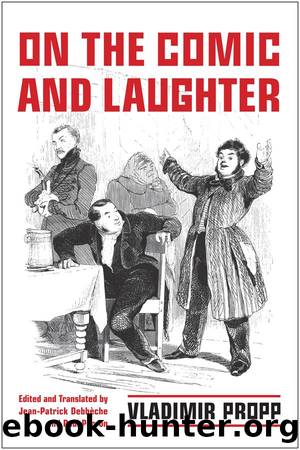On the Comic and Laughter by Vladimir Propp

Author:Vladimir Propp [Propp, Vladimir]
Language: eng
Format: epub
Tags: LIT004240, LIT004240, LIT016000
Publisher: University of Toronto Press
Published: 2009-11-06T16:00:00+00:00
19 Comic Characters
I will now turn to another large domain of the comic, namely, comic characters. It should be made clear at the outset that strictly speaking comic characters do not actually exist. Any negative characteristic can be ridiculed using the same methods by which a comic effect is produced. What are the main techniques for portraying comic characters? It was Aristotle (1984) who said that âas for comedy, it is (as has been observed) an imitation of men worse than the averageâ (II:2319). In other words, exaggeration of negative traits to draw the reader or spectatorâs attention to them is required in order to create comic characters. In our study of nineteenth-century Russian literature, we noticed that they are created, as we have already shown, by taking some particular feature and magnifying it so that it becomes visible to everyone. Hegel (1975, 18â19) defines caricature as follows: âin caricature the specific character is exaggerated and is, as it were, a superfluity of the characteristic.â
Gogol created his comic characters in exactly this way: Manilov [from the Russian lure] is the embodiment of sugariness, Sobakevich [from the Russian dog] of rudeness, Nozdryov [from the Russian nostril] of dissoluteness, Pluyshkin [from the Russian bun] of avarice, etc. But exaggeration is not the only precondition for a character to be comical. Aristotle pointed out that negative traits are exaggerated in comedy but that they must remain within certain limits and reflect a a degree of moderation.1 He noted that negative qualities should not go as far as depravity, should not make the spectator suffer, and must not cause aversion or feelings of superiority. Minor flaws are comical: cowards in everyday life (but not at war) can prove to be comical, along with boasters, toadies, careerists, small cheats, pedants and profiteers of all kinds, hoarders and grabbers, vain and arrogant people who try to appear younger in such a way that they look ridiculous, despotic wives and henpecked husbands, etc.
If we took this approach we would have to make a complete catalogue of human flaws and illustrate each with examples from literature. Such attempts have actually been made. Vices â flaws that become pernicious â are the subject of tragedy rather than comedy. Even so the demarcation is not always so clear; for example, Molière portrays Don Juan as a comic character who perishes tragically. Where is the line between depravity, which constitutes the core of tragedy, and the flaws that are possible in comedy? It is impossible to determine this logically, as it depends on the authorâs talent and skill. A trait that is comical if exaggerated moderately turns out to be tragic if taken to the level of a vice. This is obvious when, for example, two misers â Plyushkin in Gogolâs Dead Souls and the baron in Pushkinâs âThe Covetous Knightâ â are compared. The baronâs avarice is immense:
All, all I hold
In sway ⦠Like some dark, brooding demon I
Sit on my hidden throne. (1990, 100)
Besides being avaricious, the baron has a gloomy philosophy of the power of gold and an awareness of his own potential power over the world.
Download
This site does not store any files on its server. We only index and link to content provided by other sites. Please contact the content providers to delete copyright contents if any and email us, we'll remove relevant links or contents immediately.
Still Foolin’ ’Em by Billy Crystal(36335)
Spell It Out by David Crystal(36099)
The Great Music City by Andrea Baker(31902)
Professional Troublemaker by Luvvie Ajayi Jones(29641)
Trainspotting by Irvine Welsh(21608)
Call Me by Your Name by André Aciman(20466)
We're Going to Need More Wine by Gabrielle Union(19020)
The Secret History by Donna Tartt(19002)
Cat's cradle by Kurt Vonnegut(15302)
Ready Player One by Cline Ernest(14618)
Molly's Game by Molly Bloom(14123)
Bombshells: Glamour Girls of a Lifetime by Sullivan Steve(14038)
The Goal (Off-Campus #4) by Elle Kennedy(13640)
Leonardo da Vinci by Walter Isaacson(13292)
4 3 2 1: A Novel by Paul Auster(12354)
The Social Justice Warrior Handbook by Lisa De Pasquale(12177)
The Break by Marian Keyes(9347)
Crazy Rich Asians by Kevin Kwan(9262)
The remains of the day by Kazuo Ishiguro(8949)
